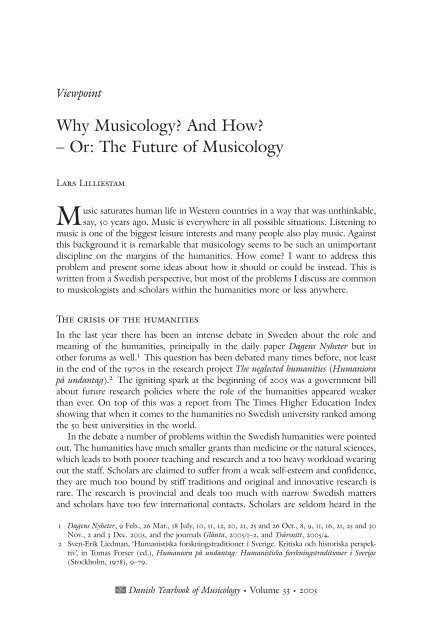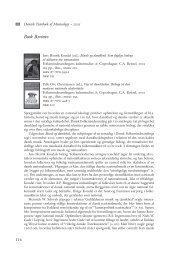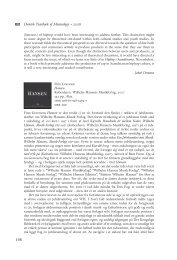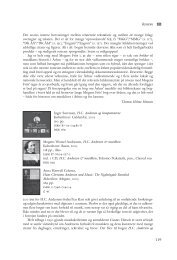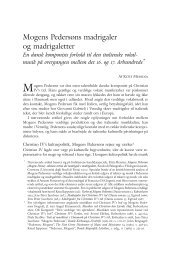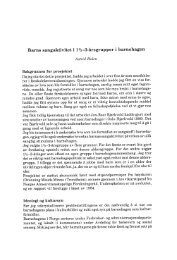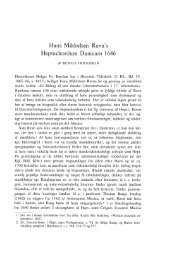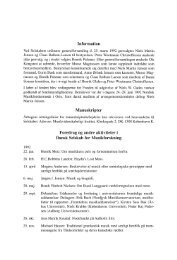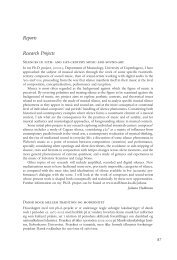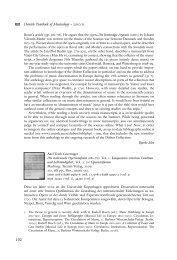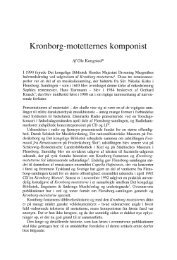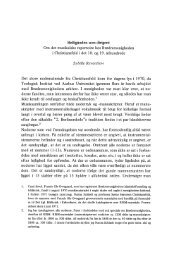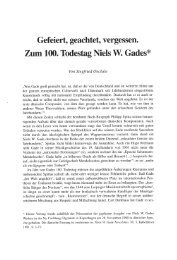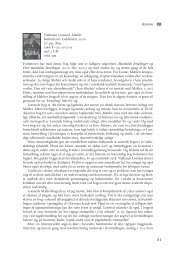Danish Yearbook of Musicology 33 ⢠2005 / Dansk årbog ... - dym.dk
Danish Yearbook of Musicology 33 ⢠2005 / Dansk årbog ... - dym.dk
Danish Yearbook of Musicology 33 ⢠2005 / Dansk årbog ... - dym.dk
Create successful ePaper yourself
Turn your PDF publications into a flip-book with our unique Google optimized e-Paper software.
Viewpoint<br />
Why <strong>Musicology</strong> And How<br />
– Or: The Future <strong>of</strong> <strong>Musicology</strong><br />
Lars Lilliestam<br />
Music saturates human life in Western countries in a way that was unthinkable,<br />
say, 50 years ago. Music is everywhere in all possible situations. Listening to<br />
music is one <strong>of</strong> the biggest leisure interests and many people also play music. Against<br />
this background it is remarkable that musicology seems to be such an unimportant<br />
discipline on the margins <strong>of</strong> the humanities. How come I want to address this<br />
problem and present some ideas about how it should or could be instead. This is<br />
written from a Swedish perspective, but most <strong>of</strong> the problems I discuss are common<br />
to musicologists and scholars within the humanities more or less anywhere.<br />
The crisis <strong>of</strong> the humanities<br />
In the last year there has been an intense debate in Sweden about the role and<br />
meaning <strong>of</strong> the humanities, principally in the daily paper Dagens Nyheter but in<br />
other forums as well. 1 This question has been debated many times before, not least<br />
in the end <strong>of</strong> the 1970s in the research project The neglected humanities (Humaniora<br />
på undantag). 2 The igniting spark at the beginning <strong>of</strong> <strong>2005</strong> was a government bill<br />
about future research policies where the role <strong>of</strong> the humanities appeared weaker<br />
than ever. On top <strong>of</strong> this was a report from The Times Higher Education Index<br />
showing that when it comes to the humanities no Swedish university ranked among<br />
the 50 best universities in the world.<br />
In the debate a number <strong>of</strong> problems within the Swedish humanities were pointed<br />
out. The humanities have much smaller grants than medicine or the natural sciences,<br />
which leads to both poorer teaching and research and a too heavy workload wearing<br />
out the staff. Scholars are claimed to suffer from a weak self-esteem and confidence,<br />
they are much too bound by stiff traditions and original and innovative research is<br />
rare. The research is provincial and deals too much with narrow Swedish matters<br />
and scholars have too few international contacts. Scholars are seldom heard in the<br />
1 Dagens Nyheter, 9 Feb., 26 Mar., 18 July, 10, 11, 12, 20, 21, 25 and 26 Oct., 8, 9, 11, 16, 21, 25 and 30<br />
Nov., 2 and 3 Dec. <strong>2005</strong>, and the journals Glänta, <strong>2005</strong>/1–2, and Tvärsnitt, <strong>2005</strong>/4.<br />
2 Sven-Erik Liedman, ‘Humanistiska forskningstraditioner i Sverige. Kritiska och historiska perspektiv’,<br />
in Tomas Forser (ed.), Humaniora på undantag: Humanistiska forskningstraditioner i Sverige<br />
(Stockholm, 1978), 9–79.<br />
<strong>Danish</strong> <strong>Yearbook</strong> <strong>of</strong> <strong>Musicology</strong> • Volume <strong>33</strong> • <strong>2005</strong>
<strong>Danish</strong> <strong>Yearbook</strong> <strong>of</strong> <strong>Musicology</strong> • <strong>2005</strong><br />
public debate. The traditional dissertation in the form <strong>of</strong> a monograph is a rigid<br />
and antiquated form. Swedish scholars ought to write much more in English and<br />
adjust to the form used in medicine or the natural sciences: thus no large monographs<br />
but short articles. The Swedish secondary schools, which were reorganized<br />
in the early 1990s, are also claimed to provide deficient basic skills and knowledge<br />
for university studies.<br />
No doubt some <strong>of</strong> these claims are true while others can be debated and questioned.<br />
Undoubtedly it is true that the humanities live with low allowances and its<br />
place in the public debate is <strong>of</strong>ten obscure.<br />
Another important problem which has been pointed out is that Swedish studies<br />
within the humanities deal too little with contemporary problems and issues. In the<br />
following presentation I will specially address this issue.<br />
So if there are problems with Swedish humanities in general the problems <strong>of</strong><br />
Swedish musicology must be seen in relations to these. There have been critical<br />
voices raised about musicology in later years but practically no public debate. <strong>Musicology</strong>,<br />
by the way, is only mentioned once, in passing, in the mentioned debate in<br />
Dagens Nyheter.<br />
So let us now deal with the specific musicological problems, continuing in the<br />
footsteps <strong>of</strong> Henrik Karlsson, Ansa Lønstrup, and myself in earlier critical articles. 3<br />
The students <strong>of</strong> musicology<br />
A majority <strong>of</strong> those who start to study musicology at ground level in the early<br />
twenty-first century have little experience <strong>of</strong> classical music. Many have never heard<br />
a whole symphony or opera or do not know who Mozart was. They are not familiar<br />
with the traditional canon <strong>of</strong> art music, composers, or their works. The literature on<br />
music history is seen by many students as boring and antiquated, dealing with music<br />
they do not know, in a way that is foreign to them.<br />
On the other hand, the majority <strong>of</strong> present-day students have experiences <strong>of</strong><br />
many different types <strong>of</strong> music, albeit with the basis in contemporary ‘popular music’<br />
forms. They are <strong>of</strong>ten curious about music they know little about and readily discuss<br />
3 Henrik Karlsson, ‘Musikvetenskaplig förmedling’, in Thomas Holme Hansen (ed.), 13th Nordic<br />
Musicological Congress Aarhus 2000. Papers and Abstracts (Aarhus, 2002), 111–19; Ansa Lønstrup,<br />
‘Strategier i musikforskningen’, <strong>Danish</strong> <strong>Yearbook</strong> <strong>of</strong> <strong>Musicology</strong>, 31 (2003), 9–15; Lars Lilliestam,<br />
‘Vad gör vi med musikvetenskapen’, STM Online, 8 (<strong>2005</strong>) (www.musik.uu.se/ssm/stmonline/<br />
vol_8/index.html). See also studies with critical perspectives like Olle Edström, ‘Fr-a-g-me-n-ts – a<br />
discussion on the position <strong>of</strong> critical ethnomusicology in contemporary musicology’, Svensk tidskrift<br />
för musikforskning, 79/1 (1997), 9–68; Olle Edström, En annan berättelse om den västerländska<br />
musikhistorien och det estetiska projektet (Göteborg, 2002); and Tobias Pettersson, ‘De bildade<br />
männens Beethoven: Musikhistorisk kunskap och social formering i Sverige mellan 1850 och<br />
1940’, (Diss.; Göteborg universitet, 2004); and on English ground, among others, Nicholas<br />
Cook, Music, imagination, culture (Oxford, 1990); Nicholas Cook, Music – a very short introduction<br />
(Cambridge, 1998); articles in Nicholas Cook and Mark Everist (eds.), Rethinking Music (Oxford<br />
and New York, 1999); and Martin Clayton, Trevor Herbert, and Richard Middleton (eds.), The<br />
cultural study <strong>of</strong> music. A critical introduction (New York and London, 2003).<br />
10
Viewpoint<br />
matters <strong>of</strong> musical taste and meaning. Many have their stylistic abode in exclusive<br />
forms <strong>of</strong> rock music, heavy metal, world music, or improvised music, and <strong>of</strong>ten have<br />
a deep knowledge within these fields. Quite a few are also interested in older forms<br />
<strong>of</strong> rock, blues, country, gospel, or folk music.<br />
Many students have limited knowledge <strong>of</strong> reading music and <strong>of</strong> traditional music<br />
theory but may well be skilled ear players. The divide between those with a wavering<br />
basic knowledge in music theory and those with a solid knowledge are growing.<br />
Many <strong>of</strong> the ways <strong>of</strong> analysing music that musicologists have been trained in appear<br />
less relevant and hard to understand if you lack a basic understanding <strong>of</strong> traditional<br />
music theory.<br />
Taken together this means that there seems to be a growing divergence in experience<br />
and interest between, on the one hand, young students and, on the other hand,<br />
teachers, and senior scholars. The young to a large extent pose other questions and<br />
have different interests.<br />
The future musicologists are trained now. If musicology is going to survive as a<br />
university discipline a reorientation is necessary both in the practice <strong>of</strong> teaching and<br />
in the contents <strong>of</strong> the curriculum, which must be adjusted both to changing qualifications<br />
and interests among students and to the problems <strong>of</strong> the music culture <strong>of</strong><br />
today and tomorrow.<br />
Research<br />
As a musicologist you <strong>of</strong>ten get questions both from the general public and from<br />
students that are difficult to answer because there is no or very little research. I have<br />
<strong>of</strong>ten met colleagues from other disciplines who have been surprised by the fact that<br />
musicologists seem to deal so little with present day music and problems. We live in<br />
a time with extremely rapid and radical changes in media technology and use, as well<br />
as in musical socialization and the ways people use music in their everyday lives –<br />
but do musicologists really notice this Questions generated by these changes seem<br />
to be tackled more <strong>of</strong>ten by others than musicologists, such as sociologists, media<br />
researchers, economists, scholars in cultural studies, etc. 4<br />
It is a cornerstone in humanities that it is the researcher’s privilege to formulate<br />
his or her own research problem. Consequently, the typical humanistic research<br />
project is a solo project governed more by personal interests than by thoughts <strong>of</strong><br />
relevance or the social good. Overriding agendas are mostly missing. 5 It is less common<br />
that scholars work in projects with many people involved or projects which<br />
have been commissioned by some receiver. Humanistic researchers are simply not<br />
4 See, however, Ruth Finnegan, The hidden musicians. Music-making in an English town (Cambridge,<br />
1989); Odd Are Berkaak and Even Ruud, Den påbegynte virkelighet: Studier i samtidskultur<br />
(Oslo, 1992); Tia DeNora, Music in everyday life (Cambridge, 2000); Michael Bull,<br />
Sounding out the city. Personal stereos and the management <strong>of</strong> everyday life (Oxford, 2000); and<br />
Clayton, Herbert, and Middleton (eds.), The cultural study <strong>of</strong> music, as examples <strong>of</strong> studies dealing<br />
with such problems.<br />
5 Karlsson, ‘Musikvetenskaplig förmedling’, and Lønstrup, ‘Strategier i musikforskningen’.<br />
11
<strong>Danish</strong> <strong>Yearbook</strong> <strong>of</strong> <strong>Musicology</strong> • <strong>2005</strong><br />
used to think in terms <strong>of</strong> ‘societal good’ or relevance. I am convinced, however, that<br />
we have to! It is a minimum demand that the scholar asks what relevance or usefulness<br />
his or her research has and who is interested in it (except the scholar himself!) etc.<br />
Suggestions<br />
It is my conviction that musicology, like any other discipline, must have contemporary<br />
problems as its starting point. In my opinion, the focus <strong>of</strong> modern musicology<br />
must primarily be on those musical forms and genres that the majority use and listen<br />
to. We have to have a keen eye for changes in musical behaviour and habits. What is<br />
to be considered as ‘contemporary problems’ and as immediate and pressing questions<br />
must be continuously discussed. So let me present some suggestions for a<br />
musicology <strong>of</strong> the future.<br />
1. All kinds <strong>of</strong> music can and have to be investigated! Classical or art music does not<br />
have a unique position. An important field <strong>of</strong> study is how different ‘music worlds’<br />
or genres relate to each other, and how people move between them and combine<br />
tastes for different types <strong>of</strong> music and musical activities. 6<br />
2. Inspiration for this approach to the study <strong>of</strong> music can favourably be taken from<br />
ethnomusicology. The ethnomusicologist Bruno Nettl once defined ethnomusicology<br />
as ‘what musicology ought to be but hasn’t become’. 7 Music is part <strong>of</strong> the totality <strong>of</strong><br />
human life and must be studied in context. Alan P. Merriam claimed that to get a<br />
comprehensive picture <strong>of</strong> the music <strong>of</strong> a foreign culture you must consider conceptualization<br />
about music, behaviour in relation to music, and music sound itself. 8 It<br />
goes without saying that we ought to have the same perspective on music in our<br />
own culture!<br />
To study the conceptualization <strong>of</strong> music means to investigate people’s ideas <strong>of</strong><br />
music and how they describe, think and speak <strong>of</strong> music, and how they categorize,<br />
designate, and evaluate music. What from time to time has been seen as ‘low’ and<br />
‘high’ music is a particularly interesting field.<br />
To study the behaviour in relation to music means to focus on what you do in<br />
connection with music, and when, where, how, and why people use different kinds<br />
<strong>of</strong> music as well as what effect the music has.<br />
Studying music sound is to investigate musical structures and how they are performed,<br />
and also how use, behaviour, and conceptualization about music cohere<br />
with different musical structures.<br />
Music analysis is not a means in itself. It is a tool for describing and understanding<br />
how human beings communicate in non-verbal sounds (though <strong>of</strong>ten in combination<br />
with lyrics, i.e. semantic sounds). Music analysis is a study <strong>of</strong> how people express<br />
themselves in musical sounds, how musical styles, genres and conventions (‘languages’,<br />
6 Finnegan, The hidden musicians.<br />
7 Bruno Nettl, The study <strong>of</strong> ethnomusicology. Twenty-nine issues and concepts (Chicago and London,<br />
1983), 3.<br />
8 Alan P. Merriam, The anthropology <strong>of</strong> music (Evanston, 1964), 32.<br />
12
Viewpoint<br />
‘grammars’, ‘dialects’) are constructed and applied in different situations as well as<br />
how they change over time. It is just as important to investigate how music and<br />
musical ‘languages’ change, as it is to examine verbal language and its changes.<br />
Music should thus be understood not only as objects, something that sounds, or<br />
musical ‘works’, but also as an activity, as something people do. The terms ‘musicking’<br />
and ‘to music’, once coined by Christopher Small, 9 comes to mind.<br />
3. The study <strong>of</strong> music must start from today’s perspective at the same time as it has<br />
to have a historical perspective. Historical music, let us say Mozart, is used and<br />
valued and performed today, here and now, in other ways than when it was created.<br />
How did the music sound, and how has it been used, evaluated, and described in<br />
the past – and in the present day How did the Western canon <strong>of</strong> musical works and<br />
composers originate, develop, and how has it been applied in different situations<br />
4. There are still enormous gaps <strong>of</strong> ignorance within musicology when it comes to<br />
many <strong>of</strong> the most popular and widespread musical expressions. We need pr<strong>of</strong>ound<br />
and nuanced studies about everyday-music (from children’s songs to psalms) and<br />
popular genres: ‘svensktoppen’ and ‘dansktoppen’ (Swedish and <strong>Danish</strong> main stream<br />
popular music), dance music, the innumerable subgenres within ‘rock’ and ‘pop’,<br />
techno, disco, schlager, film music, computer game music … . The project about <strong>Danish</strong><br />
rock history is a commendable initiative – as well as the international conference<br />
The local, the global and the regional that was held in Copenhagen in October <strong>2005</strong>.<br />
If we do not understand commonplace musical forms and their use and attraction we<br />
do not have good enough tools to understand more exclusive forms <strong>of</strong> music either.<br />
The obvious focus and aim <strong>of</strong> the humanities must be to get a versatile picture <strong>of</strong><br />
human behaviour which is as complete and accurate as possible. To do this you<br />
cannot on any ground exclude any kind <strong>of</strong> human behaviour and activity, for instance<br />
musical styles and expressions, as less interesting, not possible to study, or not<br />
worthy <strong>of</strong> investigation. No musical sound or use is too ‘trite’ not to be studied.<br />
5. When it comes to analysing music the problem is not only which music is analysed<br />
but also, and perhaps more important, how it is analysed. In my opinion many<br />
<strong>of</strong> musicology’s established models for music analysis can be questioned. Who really<br />
listens to music in the ways musicologists assume that they do<br />
Many analytical models presuppose a specific structural listening and ways to<br />
apprehend and experience music that only a small portion <strong>of</strong> the music’s audience<br />
and users apply and understand. There is a big difference between what might be<br />
called an analytical, structural or perhaps musicological approach or listening mode,<br />
and an everyday listening based primarily on uses like pleasure and enjoyment, relaxation,<br />
mood control, and dance.<br />
As researchers we ought to start with the simple question: how do people really<br />
listen to and perceive music What do different individuals apprehend <strong>of</strong> musical<br />
structures What do lyrics mean to different people What do you listen for in different<br />
genres It might be worth a try to ground music theoretical thinking and con-<br />
9 Christopher Small, Musicking. The meanings <strong>of</strong> performing and listening (Hannover, 1998).<br />
13
<strong>Danish</strong> <strong>Yearbook</strong> <strong>of</strong> <strong>Musicology</strong> • <strong>2005</strong><br />
cepts in the musical forms that the students <strong>of</strong> today are more familiar with than the<br />
traditional approach originally based on European art music. Another way could be<br />
to approach music theory through the modern computer programs for music making.<br />
Even Ruud, pr<strong>of</strong>essor <strong>of</strong> musicology in Oslo, has criticized musicology for being<br />
one <strong>of</strong> the most technical disciplines <strong>of</strong> the humanities whose analyses <strong>of</strong>ten get<br />
‘impenetrable for outsiders. The result is that musicology becomes isolated as a humanistic<br />
discipline, living its quiet life in a positivistic enclave’. 10 Many analyses <strong>of</strong><br />
music are written only for those with a solid knowledge <strong>of</strong> music theory and appear<br />
as gibberish for those who lack this knowledge. There certainly lies a challenge, not<br />
only for musicologists but for scholars in general, to present their analyses to a larger<br />
audience in understandable and popular ways.<br />
Another problem is that traditional concepts <strong>of</strong> music theory in many cases are<br />
insufficient when analysing modern ‘popular music’ for instance. They may work well<br />
for those parameters in music that can be notated, but when it comes to the analysis<br />
and description <strong>of</strong> sound, rhythmic nuances, and inflections – parameters that are<br />
infinitely important in many forms <strong>of</strong> contemporary music – the tools <strong>of</strong> music analysis<br />
are rather unsophisticated. Developing new tools <strong>of</strong> music analysis is urgent.<br />
6. There is a growing insight that many problems demand interdisciplinary treatment,<br />
and that neither the humanities alone, nor any other disciplinary field alone,<br />
can deliver thorough answers. In many cases it is necessary with teamwork and collaborations<br />
in projects between, for example, musicologists, psychologists, medical<br />
scientists, sociologists, economists, etc.<br />
As a musicologist I have sometimes felt slightly estranged in relation to the ways<br />
advocates for other disciplines look at and study music, both when it comes to<br />
musical practice and concepts <strong>of</strong> music. Many more meetings are required between<br />
researchers from different disciplines to bring about deeper and better questions and<br />
approaches, solutions, and answers.<br />
7. As a Swedish musicologist it must be my task to investigate Swedish music and<br />
Swedish musical culture. Who would do it otherwise This also means that my research<br />
naturally should be presented in Swedish. My findings must, however, also<br />
be related to the musicological world at large. It is <strong>of</strong> utmost importance that good<br />
Swedish studies are translated into English or substantially summarized.<br />
It has been claimed that Swedish dissertations ought to be written in English, but<br />
in many cases it will be strange and strained to read about Swedish music or lyrics,<br />
or any Swedish cultural matters, in a foreign language – not to mention what you<br />
lose in precision, depth, and nuance when you do not write in your first language.<br />
This brings up yet another problem: the Anglicization <strong>of</strong> Swedish (or <strong>Danish</strong>)<br />
research. It is very easy to keep good contact with English-speaking scholars and<br />
their works, but contacts with musicology and other disciplines in non Englishspeaking<br />
areas ought to be much more frequent.<br />
10 Berkaak and Ruud, Den påbegynte virkelighet, 209. Many other scholars have also discussed this<br />
problem, among them Cook, Music, imagination, culture.<br />
14
Viewpoint<br />
8. On the other hand you cannot take for granted what is to be considered as Swedish<br />
music in modern multi-cultural society. Neither the Western canon <strong>of</strong> art music nor<br />
the history <strong>of</strong> Western ‘popular music’ is self-evidently relevant for people with non-<br />
Western backgrounds. How do we as musicologists deal with this How can we involve<br />
differing cultural traditions in our teaching and research Of course the problem<br />
is similar in other disciplines <strong>of</strong> the humanities, like, history, literature, and art.<br />
9. What do people do with music And what does music do with people To my mind these<br />
are the most interesting and urgent questions. Music is an instrument that human beings<br />
use for different purposes. Music is an ideological tool, a means for orientation and<br />
an expression <strong>of</strong> values. A study <strong>of</strong> changes in musical sound and <strong>of</strong> people’s use and<br />
conceptualization <strong>of</strong> music can reveal a lot about social, cultural, and ideological conditions<br />
and changes. This approach has been called ethnomusicology on your home<br />
ground, doorstep musicology, the cultural study <strong>of</strong> music, or cultural musicology.<br />
We urgently need deeper knowledge not only about characteristics <strong>of</strong> musical<br />
styles and genres but also about themes such as listening, dancing, how music is<br />
created, the collection <strong>of</strong> music, reading about music, music and identity (‘the<br />
soundtrack <strong>of</strong> my life’), great experiences <strong>of</strong> music, being a fan, local music histories,<br />
music and work, ceremonies, music, religion and the philosophy <strong>of</strong> life, music and<br />
the brain, the relation between music and health, music therapy, soundscapes, musical<br />
socialization and pedagogy, the relation between music and class, gender, and<br />
ethnicity, music festivals, live music, music production, music technology, changing<br />
musical patterns and behaviour … . The kind <strong>of</strong> musicology that mainly deals with<br />
‘traditional’ music history, biographies <strong>of</strong> composers, and ‘traditional’ theoretical<br />
analyses <strong>of</strong> their works is less urgent in the present situation.<br />
When I began to study musicology with Jan Ling in the early 1970s it soon became<br />
evident that you could gain immensely interesting insights to human behaviour<br />
by studying music. This is still a personal guiding star.<br />
Concluding remarks<br />
It is my strong conviction that changes <strong>of</strong> the kind I have suggested are necessary if<br />
musicology should be a living, modern, and relevant discipline. We work on the<br />
taxpayer’s commission and money. It is our duty to deliver relevant, useful, and<br />
current knowledge about music and new and inventive perspectives on what it<br />
means to be a human being in present day society.<br />
It is also the road we have to travel if we want to live up to the songs <strong>of</strong> praise<br />
about the usefulness <strong>of</strong> the humanities and the visions <strong>of</strong> what humanities ought to<br />
be that were expressed in the Swedish debate in <strong>2005</strong>, as: ‘a place where society<br />
scrutinizes itself and becomes aware <strong>of</strong> itself’, a forum for ‘critical reflection’ or ‘critical<br />
examination from a historical perspective’, ‘a corrective and a stimulant to other<br />
sciences’, a tool for strengthening democracy. 11<br />
11 The quotes are from contributions in the debate in Dagens Nyheter <strong>2005</strong> by Sara Danius, Lisbeth<br />
Larsson and Ebba Witt-Brattström.<br />
15
<strong>Danish</strong> <strong>Yearbook</strong> <strong>of</strong> <strong>Musicology</strong> • <strong>2005</strong><br />
Sven-Erik Liedman, pr<strong>of</strong>essor <strong>of</strong> the history <strong>of</strong> ideas at Göteborg University,<br />
claimed almost thirty years ago that the usefulness <strong>of</strong> the humanities basically is<br />
‘ideological’ by which he meant ‘all means to influence peoples’ concepts about the<br />
world, society, and themselves with research and research findings’. 12<br />
Naturally this is valid for musicology as well. How these visions should be implemented<br />
is a most pressing issue that we as scholars and musicologists must address<br />
if the discipline is to survive.<br />
12 Liedman, ‘Humanistiska forskningstraditioner i Sverige’, 10. See also Sven-Erik Liedman, ‘Den<br />
nya röda dagen och humanistens sotdöd’, Glänta, <strong>2005</strong>/1–2, 92–96.<br />
16


